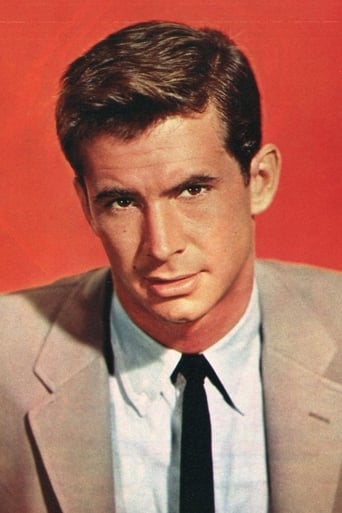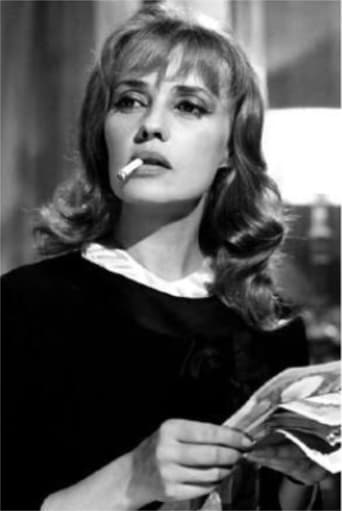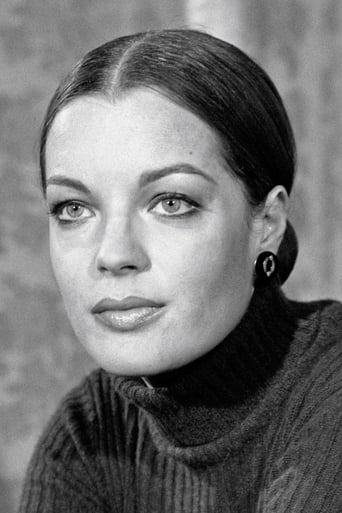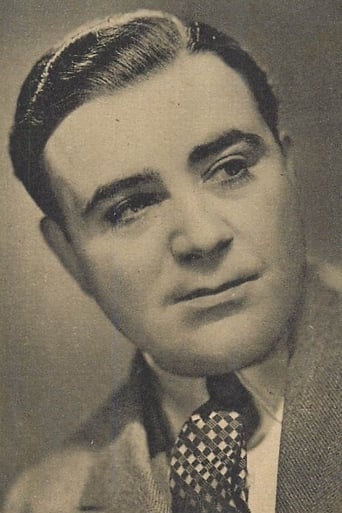Fairaher
The film makes a home in your brain and the only cure is to see it again.
Invaderbank
The film creates a perfect balance between action and depth of basic needs, in the midst of an infertile atmosphere.
Philippa
All of these films share one commonality, that being a kind of emotional center that humanizes a cast of monsters.
TheLittleSongbird
Kafka's book is simply marvellous, though difficult to adapt to film. Orson Welles' 1962 film does so laudably, and should be applauded for trying, even if it didn't quite come off (though it did do so, brilliantly).It is not as faithful as the 1993 version, which did follow the book closely while Welles' at times is more Welles than Kafka, but in terms of momentum, emotional power and atmosphere Welles' is significantly better. For the record, while to me the 1962 film was brilliant the 1993 one was a big let down and an example of being faithful not being a good thing. 'The Trial' may not be one of Welles' greatest, being not as important, innovative or influential as 'Citizen Kane' and 'A Touch of Evil', but it's still among Welles' better films and one of his more accessible in some ways.As always with Welles, 'The Trial' is extremely well made. The cinematography is wonderfully nightmarish and sometimes with an eerie and surreal quality, and Welles' use of locations is spell-binding, some of the best use of locations seen by me from any film viewed this year. The music is suitably ominous, and Welles lives up to his reputation as one of the greatest and important directors there was.The atmosphere created has a lot of power, a dark nightmarish labyrinth that is wonderfully weird, often audacious and sometimes surprisingly impish. 'The Trial' is grippingly and thoughtfully written, and the story is powerful and atmosphere, the tension never slipping.Performances are top notch. Anthony Perkins is excellent, conveying his character's paranoia extremely convincingly. Jeanne Moreau and Romy Schneider are mysterious and exotic.In conclusion, marvellous film and while a less faithful adaptation of Kafka's book it's vastly superior too. 10/10 Bethany Cox
John Brooks
This film receives such good reviews now because it is the movie-going, pseudo-intellectual clique that rates and comments it. This film gets all its power from status and fame: written originally by Kafka, directed and interpreted by Orson Welles, starring every oddball's beloved (and admittedly great actor) Anthony Perkins. If this doesn't smell like pseudo-intellectual cinematic elitism, nothing ever will.This film, as all which lack any heart or girth at the core, focuses on acting (Perkins fantastic, rest very good too), strong cinematography, and atmosphere. And yet, not everything that glitters is gold. This is a case of shape rather than depth, form over content, exterior vs inside, artifice better than true quality. This here is the narrative of the film rather than the film itself: a film should have a great point and a great conclusion, but should also have...well, a great film ! This here is just plain boring because once one has appreciated the eerie atmosphere of empty, humanless landscapes, the absurd in the works, the strange characters etc... there isn't anything left to digest but lengthy, lengthy intervals of futile dialog, never an ounce of symbolism or worthwhile depth, just a ton of the self-indulgent, steady-paced same old exchanges. The so-called tension is never really there, and the tagline "the logic of a nightmare" just never incarnates in the film. The introductory little cartoon sets the tone for a masterpiece with a wealth of symbolism and deep literary purpose, and the first 40 minutes are very good and intriguing; but how quickly the film loses itself in a weak effort to further its plot and in stead dwells in a little puddle of self-absorbed irrelevance only ultra-specific fans could find to their liking. There's no universal appeal whatsoever - this film is like a severe case of the 'fish in a bowl', never lifting its head up for awareness; just totally absorbed into its technical little project, and even in its absurdity certainly could've used some clarity. The point, the narrative of the film are good; not the film.
Scott44
***Good review from StudlyFoxie ("The Best Legal Drama or Paranoia Film Ever Made", StudlyFoxie from Boston, Mass, 18 April 2004). Also, excellent background info on Kafka and Welles from Michael Coy ("The Logic Of A Dream", Michael Coy from London, England, 29 December 1999).***"The Trial (1952, Orson Welles)," a surrealistic nightmare, is audacious. Liberated from studio interference, Welles indulges in his love of visual oppression and penetrating diction. Distancing himself from mere mortals who would peer through a camera lens in order to create what has been made before, Welles serves up a uniquely uncompromising expressionistic sojourn, his personal favorite of his catalogue. While it could be tighter the chutzpah on display makes it required viewing for cinephiles . Based loosely on Franz Kafka's story, Josef K. (Anthony Perkins) wakes up one morning to discover that several police officers have entered his bedroom in order to place him under arrest. The grim authorities never disclose the charges. While not taken into custody, everything that Josef K. says and does becomes potential evidence against him.After a conversation with his landlord Mrs. Grubach (Madeleine Robinson), Josef uses the stress of the moment to make a long- delayed romantic connection with his night-club-working neighbor Marika Burstner (Jeanne Moreau). Marika is terrified of fraternizing with Josef out of concern the landlord will evict her for it. Sure enough, Marika subsequently disappears. In a memorable nighttime outdoor scene, Josef pleads for a disabled woman pulling a trunk with Marika's belongings to tell him what happened to Marika, but she won't. Josef periodically returns to his nightmarish workplace, where approximately 500 of his colleagues operate sewing machines in unison. The authorities move slowly, but eventually they compel Josef to appear before a makeshift tribunal. As with Josef's workplace, it is teeming with people. The Magistrate of the proceeding grants Josef legal protection in the form of the "Advocate." The mostly-bedridden barrister (Orson Welles), who first appears beneath an impressive cloud of tobacco smoke, is never helpful to Josef. The Advocate has a comely live-in nursemaid Leni (Romy Schnieder) who gets turned on when she meets men accused by the State of some crime. Another exceptionally beautiful woman, Hilda, has the same sexual turn-on. The smoldering, traffic-accident-inducing Elsa Martinelli (at the time a very successful Italian fashion model), portrays a second potential love interest that Josef has little interest in. Either Josef is too stressed out to accept the overtures of Leni and Hilda, or perhaps Welles is commenting on Anthony Perkins's real-life homosexuality. There are clear parallels between Josef's ordeal and Orson Welles's own. Despite his prodigious talents, Hollywood big-shots would not produce his films, forcing Welles to work abroad with meager budgets. It is useful to compare the moments where Josef is speaking despairingly to his accusers with what Orson might tell the Hollywood moguls who refuse to work with him.Shot in Black and White, "The Trial" is often dazzling. There is little doubt that this is the best use of the Gare d'Orsay location (a former train station in Paris). Welles applies his trademark deep focus, creating a dreamlike atmosphere. His backgrounds are often replete with detail. Moving to the auditory qualities, Welles's fondness of jazz music is apparent when he introduces it during a particularly odd scene when Josef visits an artist's studio. The cast is very theatrical, and the voices are generally all compelling. No cast member's voice is more distinctive and memorable than Welles's familiar baritone, so unrivaled in cinema. (BTW, Welles dubbed in other voices in the cast.) The conversation is very fast-paced; small talk is rare in this authoritarian society. While dark, relentless and mystifying at times, "The Trial" has moments that are really powerful. If Welles had trimmed about 15 minutes or so it would have been even better. After all, Kafka's writing is notably economical.Cinephiles are encouraged to take this in. While this era has its own totalitarian nightmare crushing working people into dust, there are no artists working today with the audacity of Orson Welles.
LeonLouisRicci
If asked what You consider the Best Film from Orson Welles, You might answer "Citizen Kane" (1941), or "The Lady from Shanghai" (1947), or "The Magnificent Ambersons" (1942), or "Touch of Evil" (1958). But when asked the same Question, Orson Welles Replied without Hesitation, "The Trial" (1962).It is a Magnificent, Bombastic, Electrifying, Surreal, and Stunning display of Cinematic Grandiosity and Expressionistic Excess. Every Scene, every Shot is Cinemagraphic. Seeing Stills from it are Impressive. This Film, from the Franz Kafka Novel, is updated occasionally to include Modern Technology like Computers and the "Modernized" Ending, but the Dystopian Vision could be from Any Period After or just Before a Holocaust.Outdoors there is not a Tree or Shrub In Sight and Indoor Plants have been Reduced to Cacti. inside the Humongous and Intimidating Buildings the Trees seem to have all been used up and made into Pulp, producing Books, Pamphlets, and Paper Records on Everyone and Everything. Today's Equivalent is the huge Data Storage Complex that the NSA has built in Utah. To Say that Kafka or Welles were Ahead of Their Time is an Understatement.This is a Perplexing, Dream-State of a Movie that is prefaced in the Introduction so it should come as No Surprise that the Film is the Least on Logic. But it is most Effective on its Visualizations of a Nightmare where an "Innocent" Man is "Accused" of Crimes without Warrants just because the "Law" Can Legally do that, so They do.This sends Anthony Perkins, as Josef K, into a Labyrinth of Bizarre Characters and even more Bizarre Surroundings. The Look of the Film is as Different and Demanding as anything put out at the Time and seems to Play with the Brain like a Hallucinogen, just like Kafka's World. What Unfolds is at times an Uneasy Watch and there are Hints of Pedophilia and Sexual Deviance that add Weight to the Accusations or more Accurately the Suspicions of "Big Brother".Note...If You are the type of Movie Buff that watches Films over and over again, here is an odd recommendation. After viewing this a number of times, watch it without the sound and just the picture, and at some other time, watch it with just the sound and no picture. Both may be a rewarding experience and may convince why Welles thought this His best Film.Note 2…Beware of the many inferior Public Domain Prints that are awful. It has now been Offered on Blu-Ray and Good Quality DVDS.







